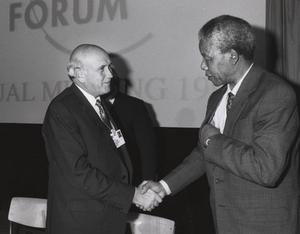Intelligence sharingCIA sued over records surrounding the 1962 arrest of Nelson Mandela
Ryan Shapiro, a Massachusetts Institute of Technology (MIT) Ph.D. candidate, filed a lawsuit yesterday (Tuesday) against the Central Intelligence Agency (CIA) over the spy agency’s failure to comply with his Freedom of Information Act (FOIA) request for records on the late Nelson Mandela. Shapiro wants to know why the CIA viewed Mandela as a threat to American security, and what actions the agency took to thwart Mandela’s efforts to advance racial justice and democracy in South Africa.

South African president F.W. de Klerk with Nelson Mandela // Source: wikipedia.org
Ryan Shapiro, a Massachusetts Institute of Technology (MIT) Ph.D. candidate, filed a lawsuit yesterday (Tuesday) against the Central Intelligence Agency (CIA) over the spy agency’s failure to comply with his Freedom of Information Act (FOIA) request for records on the late Nelson Mandela. Shapiro wants to know why the CIA viewed Mandela as a threat to American security, and what actions the agency took to thwart Mandela’s efforts to advance racial justice and democracy in South Africa.
Shapiro, a FOIA specialist, is an historian of the policing of dissent and the political functioning of national security. A Sparrow Project release reports that his FOIA work has already led the FBI to declare his MIT dissertation research a threat to national security. Shapiro also has FOIA requests for records on Mandela in motion with the Federal Bureau of Investigation, the Defense Intelligence Agency, and the National Security Agency. Shapiro is represented by attorney Jeffrey Light.
The Sparrow Project describes its mission as providing publicity and creative direction for grassroots activists.
The release notes two key issues regarding yesterday’s filing against the CIA:
- The CIA is believed to have been involved in Mandela’s 1962 arrest which led to his decades-long incarceration. Yet, the agency has never admitted its role in this affair, and little specific public information exists on the matter. Shapiro’s FOIA efforts will begin to fill this hole in public knowledge of U.S. intelligence operations.
- Despite public knowledge of U.S. intelligence assistance to apartheid South Africa in general, and in Mandela’s arrest in particular, much of the U.S. and world press has paid little attention to these issues. Even in the wake of Mandela’s death, these issues, including the fact that Mandela remained on the U.S. terror watch list until 2008, have for the most part been ignored or discounted. Shapiro’s efforts will bring much-needed attention to these topics, as well as to the U.S. intelligence community’s continued version to transparency.
The Sparrow Project’s release quotes Shapiro to say that
In bringing suit against the CIA to compel compliance with my Freedom of Information Act request, I seek access to records that will begin answering the following questions:
What was the extent and purpose of the U.S. intelligence community’s surveillance of Nelson Mandela prior to his arrest? What role did the U.S. intelligence community play in Mandela’s arrest and prosecution? What role did the U.S. intelligence community play in the broader effort to surveil and subvert the South African anti-apartheid movement? To what extent, and for what objectives, did the U.S. intelligence community surveil Mandela following his release from prison? To what extent, if any, did the U.S. intelligence community continue providing information regarding Mandela to the apartheid regime following Mandela’s release from prison? What information did the U.S. intelligence community provide American policymakers regarding Mandela and the South African anti-apartheid movement? To what extent, and to what ends, did the U.S. intelligence community surveil the anti-apartheid movement in the United States? How did the United States government come to designate Nelson Mandela a terrorist threat to this country? How did this designation remain unchanged until 2008? And what was the role of the U.S. intelligence community in this designation and the maintenance thereof?”
The full text of the lawsuit is available to read here.
